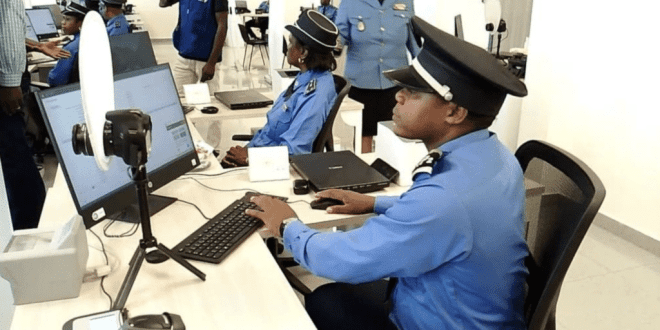Biometric Update | Opposition members of Cameroon’s National Assembly have expressed worries that that the new system for the issuance of national ID cards is not only costly, but appears more complex than the previous one.
Hon Adamou Koupit, member of parliament of the Cameroon Democratic Union (CDU) for Noun in the West Region, and Hon Evaristus Njong, Social Democratic Front (SDF) legislator for Boyo in the North West Region of the country, expressed their views on this issue recently.
They were reacting to a call made by the Speaker of the chamber, Rt Hon Cavaye Yeguie Djibril, for massive voter registration before the electorate for the October presidential election is convened by mid-July.
Voter registration and voting in Cameroon requires possession of a valid national ID card.
A new system for the issuance of national ID cards in the country went operational on February 17 for online pre-enrollment, with the biometric capture phase following a week later.
Biometric capture delays
Since then, thousands of national ID cards have been issued but there are deep concerns about the cost and length of period it takes to complete biometric capture after a successful online application. The delay is being blamed on the huge number of Cameroonians applying for the card, which has made wait times for biometric capture appointments excessively long.
“I applied online for an ID card early this month, but I am only expected to complete biometric capture some time by August ending because that’s when there are a few available slots for physical appointment,” an ID applicant who refused to be identified told Biometric Update.
Hon Koupit says he is alarmed that a system that was meant to address long standing difficulties linked to national ID acquisition has instead turned out to be more expensive and complicated than before.
“The challenge lies in how complicated the process has become. You no longer get an ID card at the local council. Now, you must go to the regional headquarters, complete pre-enrollment online, and pay huge fees,” he lamented.
There is a plan by the contractor Augentic and the ID issuing authority to decentralize ID enrollment, but the infrastructure and machines are still being put in place.
As part of the contract, a total of 68 new multi-functional structures will be built to facilitate the issuance of ID cards, including three ultra-modern ID production centers in the cities of Yaounde, Douala and Garoua, as well as enrollment centers in the regional and divisional headquarters. About 219 existing ID card registration centers are also expected to be renovated by the firm, and new equipment and machines will be deployed in all the centers.
Lamenting further, Hon Koupit said: “How many of our people have access to the internet? Many will need to visit a cyber-café and pay more money. The government had promised during debates on the 2025 finance law last November that the national ID card would cost only FCFA 10,000 (US$18). In reality, the total cost, including a nationality certificate, birth certificate certification, and internet access, comes to about FCFA 20,000 (US$36). Yet, you won’t get your ID within 48 hours.”
He mentioned the example of a Cameroonian in Moloundou [a locality in the East Region] having to travel all the way to Bertoua [Regional capital of that region] just to obtain an ID card. This is a distance of nearly 500 kilometres.
“Why make it so difficult in an election year, when we need everyone to register and vote? Perhaps, the Speaker is not fully informed of these obstacles. We plan to use this parliamentary session to ask the government to reconsider the current ID card production process,” he stated. Cameroon’s parliament is currently sitting for its mid-year session.
Free ID Cards?
To Hon Njong, it is not out of place for the government to consider issuing national ID cards for free in order to enable many more Cameroonians easily register on the electoral roll.
“We have been appealing to Cameroonians to vote massively wherever they are. But voting requires an ID card, and obtaining one has become so expensive and bureaucratic. The House Speaker himself cited examples of areas where people simply don’t have ID cards. This is not acceptable. The national ID card should be free because it’s a basic right,” Njong advocated.
“Youth make up nearly half of Cameroon’s population, yet many lack this document. If we want peace and justice, we must lay a strong foundation, starting with a credible electoral process. Sovereignty belongs to the people. When their voices are truly heard through credible elections and inclusive participation, we all win. But when elections end in unrest, nobody benefits,” he added.
Njong believes that in addition to making ID cards more easily accessible, there is also need to introduce a more efficient biometric registration system, and make it possible for internally displaced persons who are registered on the electoral roll to be able to vote wherever they find themselves.
“ELECAM needs to reach the grassroots. Full biometric registration is still lacking. What about internally displaced persons (IDPs) who can’t return to their constituencies? They should be able to vote wherever they are, even if temporarily settled elsewhere. We know the crises affecting the North West, South West, and Far North Regions. There should already be mechanisms allowing every Cameroonian to vote, regardless of location,” he suggested.
 CameroonOnline.org Cameroon news, Actualité Camerounaise, live Web TV & Radio, World News and a lot more
CameroonOnline.org Cameroon news, Actualité Camerounaise, live Web TV & Radio, World News and a lot more




